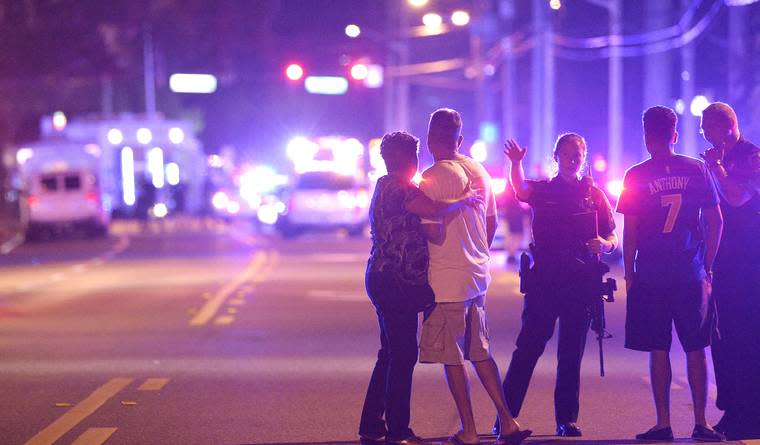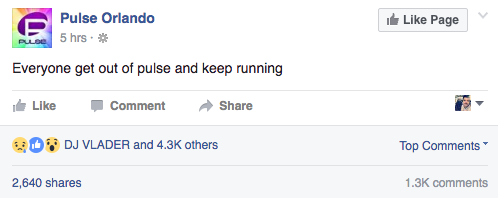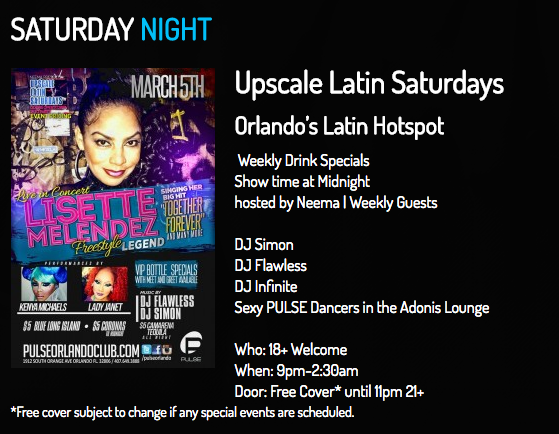Orlando Mass Shooting at Pulse Gay Nightclub Leaves at Least 50 Dead, 53 Wounded
Orlando Mayor Buddy Dyer has confirmed that a mass shooting at Pulse — a gay nightclub in Orlando, Florida — left at least 50 dead and 53 wounded, making it the deadliest mass shooting on American soil in modern U.S. history.
"BREAKING NEWS: 50 dead in Orlando nightclub shooting, Orlando mayor says. https://t.co/ZdaJMtkE0q"
The nightclub shooter, who wielded "an assault-type rifle and a handgun" and "took hostages," died in a "gunfight with SWAT officers," the Associated Press reported.
CBS News first reported that the nightclub gunman had been identified as 29-year-old Omar Mateen by police sources. Law enforcement officials reportedly later gave the same name to the Los Angeles Times.
"We are saying we are apologizing for the whole incident. We weren't aware of any action he is taking," Mir Seddique, Mateen's father, said in a phone interview with NBC News. "We are in shock, like the whole country."
"This had nothing to do with religion," Seddique added, claiming instead that his son was angered by the sight of two men kissing in downtown Miami.
NBC News reported that, according to law enforcement sources, Mateen called 911 and pledged his allegiance to the leader of ISIS just moments before carrying out the shooting. According to CNN, this phone call was the impetus of the FBI's initial suspicion that the attack was motivated by Islamist terror. The shooter also mentioned the Boston bombing in the 911 phone call, according to CNN.
NBC News: Just before shooting, Mateen called 911 in Florida and swore his allegiance to head of ISIS, Abu Bakrbakr al-Baghdadi.
@RepAdamSchiff, top Democrat on House intel committee, says he is hearing from local PD that shooter "made a pledge of alliegiance" to ISIS
Business Insider later clarified that it is unclear whether or not the terrorist group instructed Mateen to attack Pulse on Sunday.
WATCH: Father of shooter in Orlando club tells NBC News: "We are apologizing for the whole incident"https://amp.twimg.com/v/a1f07521-0c53-4010-b539-d7bf433f0361 ...
MORE: Orlando shooter ID'd as Omar Mateen, U.S. citizen from Port St. Lucie, FL http://cbsn.ws/1PU8x4x pic.twitter.com/E0cw3YAMb3
Orlando gunman tentatively identified as Omar Mateen, 29, a U.S. law enforcement officials tells my colleagues in our Washington bureau.
According to Chief Mina, at 5 A.M., Orlando police "[detonated] two explosives to distract the gunman and help clear the club," the New York Times reports.
"This is an incident, as I see it, that we certainly classify as domestic terror incident," said Orange County Sheriff Jerry Demings, according to the AP.
Florida Department of Law Enforcement Special Agent in Charge Danny Banks confirmed to the AP in an interview that the Pulse massacre "is being investigated as an act of terrorism," stating that "authorities are looking into whether this was an act of domestic or international terror, and if the shooter was a lone wolf."
"We do have suggestions that the individual may have leanings toward [radical Islam]," said FBI Special Agent in Charge Ronald Hopper, according to the AP.
Hopper also said there is "no further threat to Orlando or to the surrounding areas."
According to the New York Times, pending the results of that larger investigation, police are currently calling the nightclub shooting a "terror incident."

"I heard 20, 40, 50 shots," said Jon Alamo, a nightclub patron who told the AP he was at Pulse when the mass shooting took place, "The music stopped."
"I was thinking, are you kidding me? So I just dropped down. I just said please, please, please, I want to make it out," said Christopher Hansen, a Pulse patron who told the AP he was in the nightclub's VIP lounge when the shooting started, "And when I did, I saw people shot. I saw blood. You hope and pray you don't get shot."
At 2:09 AM on Sunday, the nightclub posted to its Facebook page that everyone currently at the club needs to "get out of Pulse and keep running."

Pulse describes itself as "Orlando's hottest gay bar" on its website. The shooting took place during "Upscale Latin Saturday", which Pulse celebrates weekly on Saturday nights.

According to The Daily Beast, club owner Barbara Poma's decision to open Pulse was spurred by the death of her brother due to complications from AIDS.
The mass shooting at the gay nightclub takes place twelve days into LGBT Pride Month, which takes place every June in America to honor the Stonewall riots that most attribute to be the catalyst for the gay rights movement in the U.S.
This is a breaking news story and will be updated as information becomes available.
June 12, 2016, 1:41 P.M ET: This story has been updated.
Read more: In Wake of Orlando Mass Shooting at Gay Nightclub, the Internet Begins to #PrayForOrlando
Correction: June 12, 2016
A previous version of this story misidentified the news outlet to which Mir Seddique gave his statement. That outlet is NBC News.


